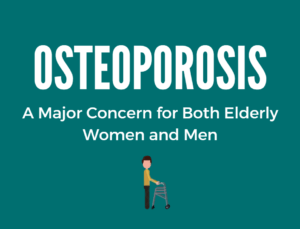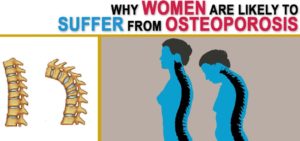

Bones are constantly growing and shrinking through the process of remodeling. When the body is lacking calcium it takes what it has stored from the bones. The bones Then become thin and brittle due to the body taking its calcium reserves, this is osteoporosis. Osteoporosis literally means porous bones Spongy bone is mostly dissolved in this proccess taking the bones support system. This makes bones fragile and prone to breakage. When bones with osteoporosis are examined spongy bone with the disease tend to have larger holes due to the lack of spongy bone. People at any age can be afflicted with this disease but it mostly affects women after menopause and people in older ages. 
It is more common in older people, especially women. But it is doesn’t have to happen to YOU when you get older. That’s because, for many people, osteoporosis can be prevented. YOU can actually build denser, stronger bones now in a way that isn’t possible later. This will make you healthier, and it will set you up to have stronger bones when you are older – when weak bones can be serious.
The term “premenopausal” refers to women who are still having regular menstrual periods and have not yet reached menopause. While it is uncommon for premenopausal women to have osteoporosis, some young women have low bone density which increases their chance of getting osteoporosis later in life.
If you are pregnant or breastfeeding, be sure to get enough calcium and vitamin D. Calcium and vitamin D are good for you and for your baby’s growing bones. If you don’t get enough of these nutrients, your baby’s calcium needs will be met by taking calcium from your bones.
When a woman reaches menopause, her estrogen levels drop and can lead to bone loss. For some women, this bone loss is rapid and severe.
The amount of bone you have when you reach menopause. The greater your bone density is to begin with, the lower rolex swiss replica watches your chance of developing osteoporosis. If you had low peak bone mass or other risk factors that caused you to lose bone, your chance of getting osteoporosis is greater. How fast you lose bone after you reach menopause. For some women, bone loss happens faster than for others. In fact, a woman can lose up to 20% of her bone density during the five – seven years following menopause. If you lose bone quickly, you have a greater chance of developing osteoporosis.
